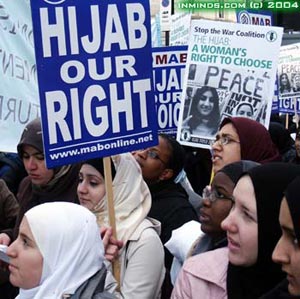As long as it’s the woman’s choice and she hurts no one in wearing that which makes her feel both pious, moral, and beautiful, then men have no reason to admonish them. The hijab seems to have an independent mind when it comes to making news. Still North Americans’ confusion and discomfort over it also nudges that.
I don’t pretend to understand the Muslim compulsion to submit to Allah by wearing the Hijab. I’m very spiritual in my way, but subscribe to no religion and bow before no god. But many literal or fundamentalist Christians act just as “strangely” as they devote themselves and submit to Christ or Jesus.
Why do we North Americans, particularly the self-righteous ones, routinely graft our social values onto others’ actions?

Muslim women happy wearing the hijab
These women are pious and revere Allah.
They go about it in a way that clashes with the way that typical American women do. Also, I suspect that women look at it as a lunging throw back to the 19th-Century epoch when North American women sought suffrage. Middle-American women can not see how other women could possible find power in a path that, for themselves, would be the abdication or surrender of that.
I have spoken to enough articulate, well-informed, educated, and feminist Muslim women – North American-born and not. I have conceded that I would more wisely listen, ask, and reconsider my assumptions and misconceptions rather than sound off and espouse evangelically about the United States’ cultural virtues [i.e., superiority].
More than five-years-ago, The Seattle Times‘ Eli Sanders described some of the complexity, including the regional and global ambiguities of interpretation, very well.

Muslim women fight for the right to wear the hijab
One question that one needs to ask is whether we care more about Hijab-wearing Muslims in the U.S. or in Muslim countries; the customs, traditions, and expectations are just as disparate their geography. So the debates won’t be the same.
The United States’ behavior has given our friends and foes enough arguments for a retort for those who live in glass houses not to throw stones. If you’re curious, read and then ask questions. After reading Sanders’ 2003 piece, above, look at Cnn’s Generation Islam.
When North America looks upon their neighbors with the same cultural lenses as their foreign policy, problems arise. Our superior attitude prevents us from earning friends across borders. When one asks a question, one sheds any veil of superiority and swithes to that of humility, interest, and openness. When one asks, one often learns.
Of course, the Muslim women who come to the U.S., have various stories to tell and experiences from which to speak. Some live under a hyper-pious, and sometimes stifling, Islamic yoke. Others do not. Then there is often a middle ground, between the extremes that journalistic forms like to emphasize, that makes this topic even harder to simplify in bite-sized – or sound bite chunks.
Women mustn’t be forced to wear the hijab, but if they choose to, they mustn’t be jeered either. Whether the issue is the equal rights amendment, which the U.S. Congress has not yet passed since it proposed it around 40-years-ago, the question of having more than one female U.S. Supreme Court justice, or North American men’s comfort with women wearing hijabs or abayas, these are women’s bodies and realms – men have meager, if any, right to sound-off first or rule on them. These are another part of women’s rights.


I just stumbled upon this article while I was looking for hijabs online. Your writing is wonderful and I, as a Muslim woman from the UK, would like to say ‘thank you’ for understanding it like it is. Forcing women to wear something is wrong, but forcing them to take off something is equally wrong. I’m glad someone agrees =).